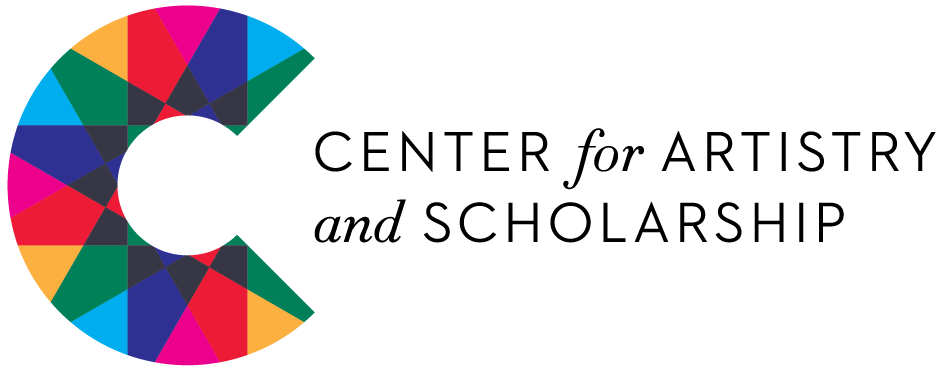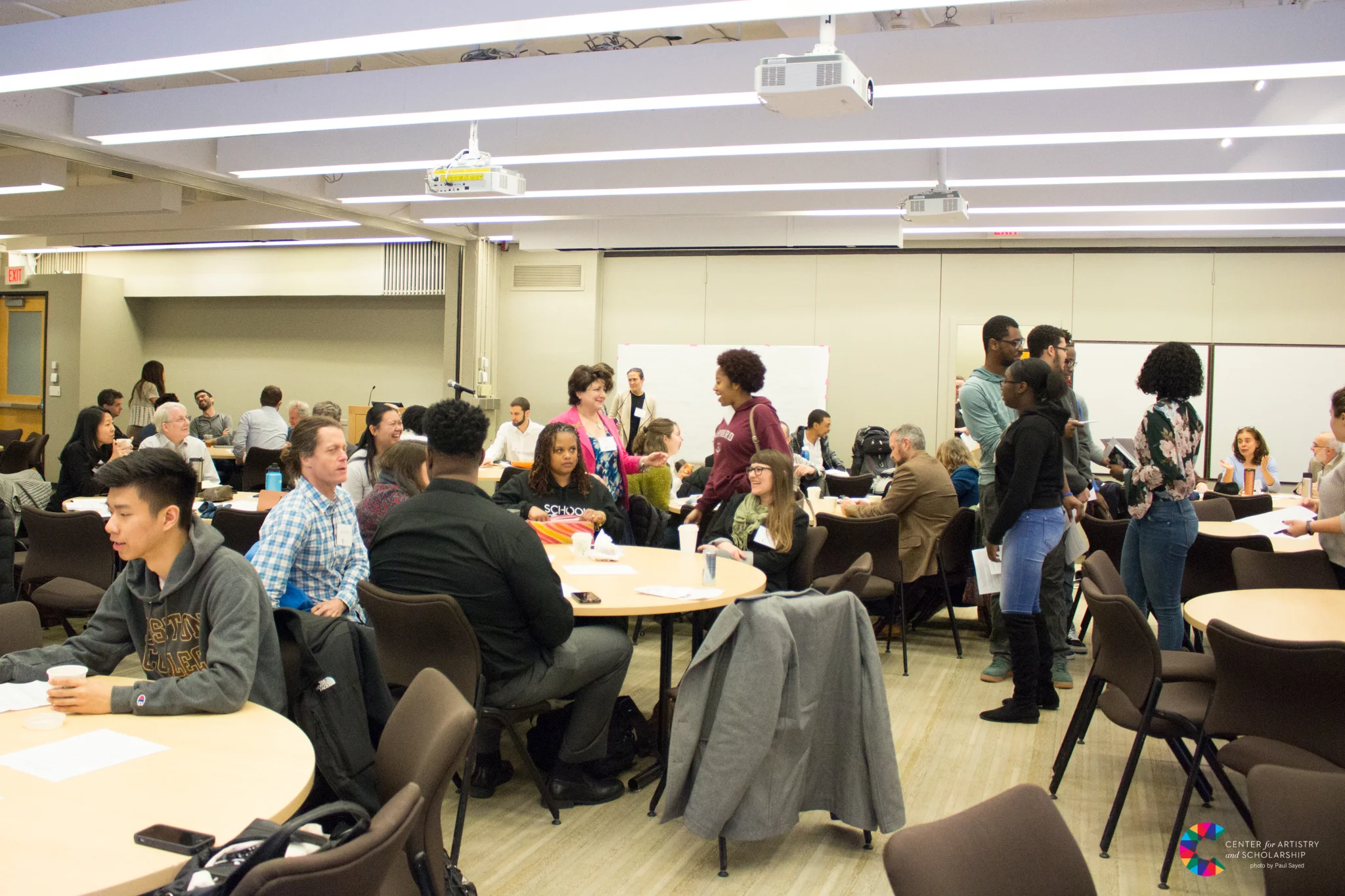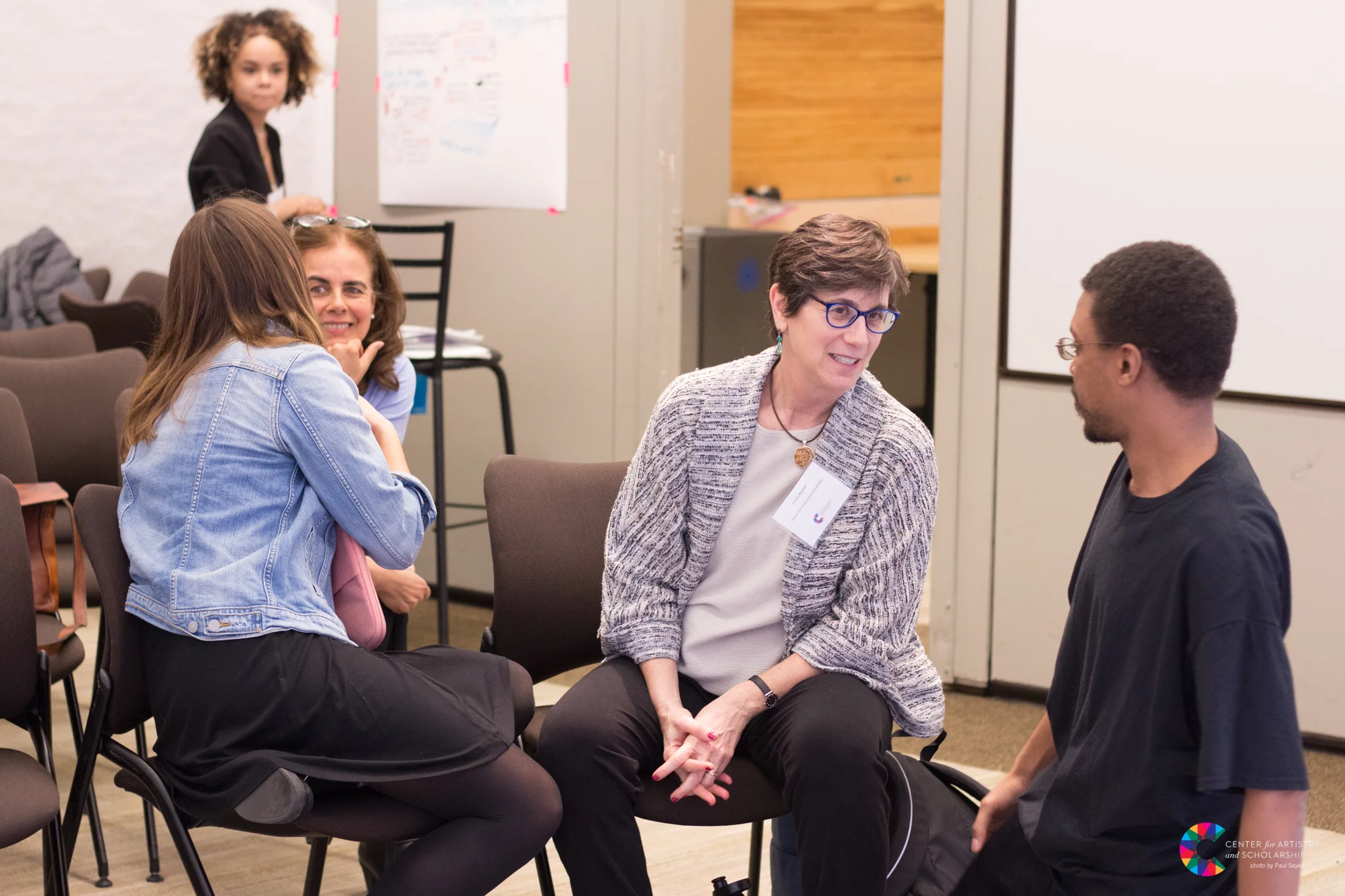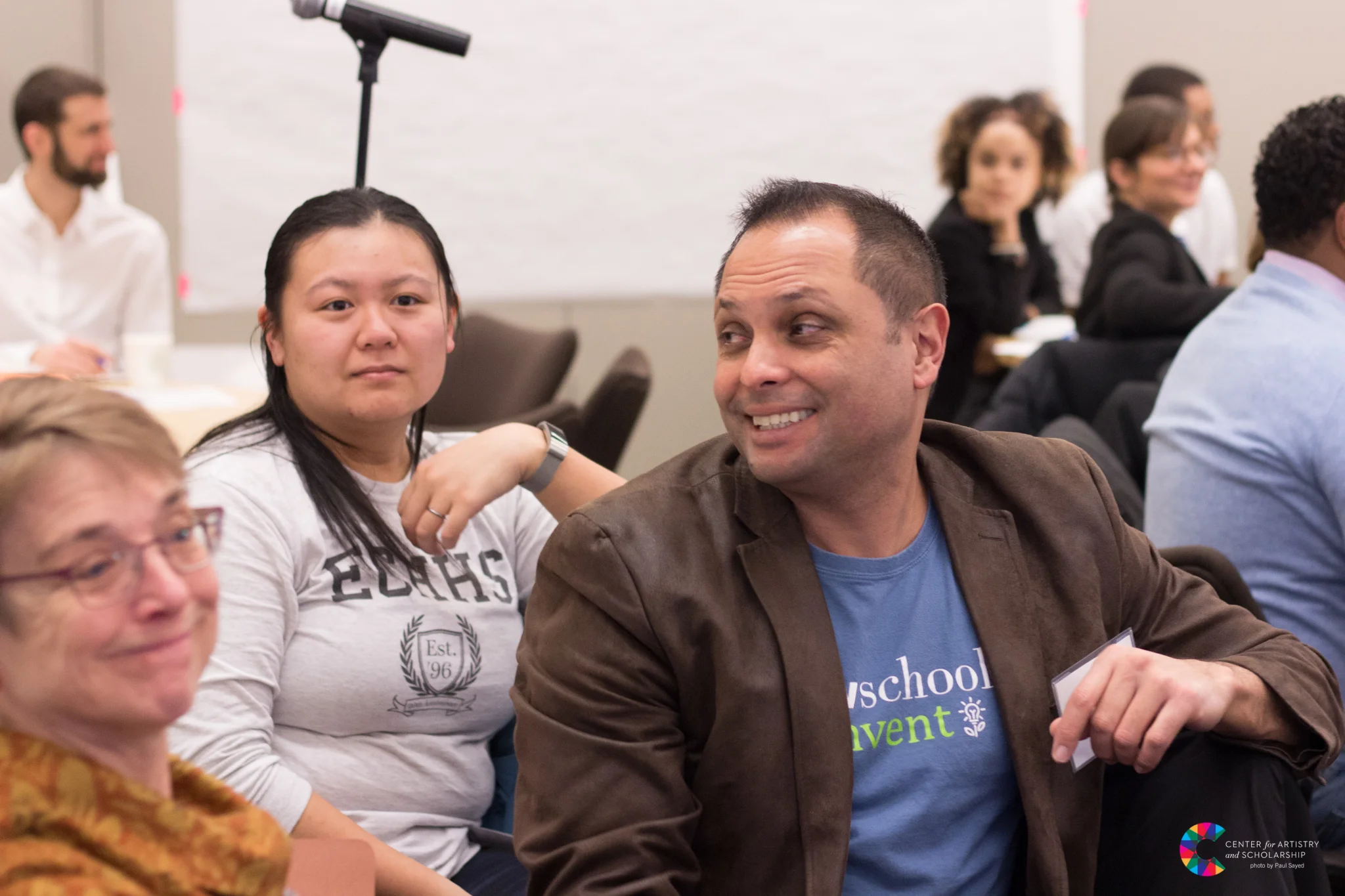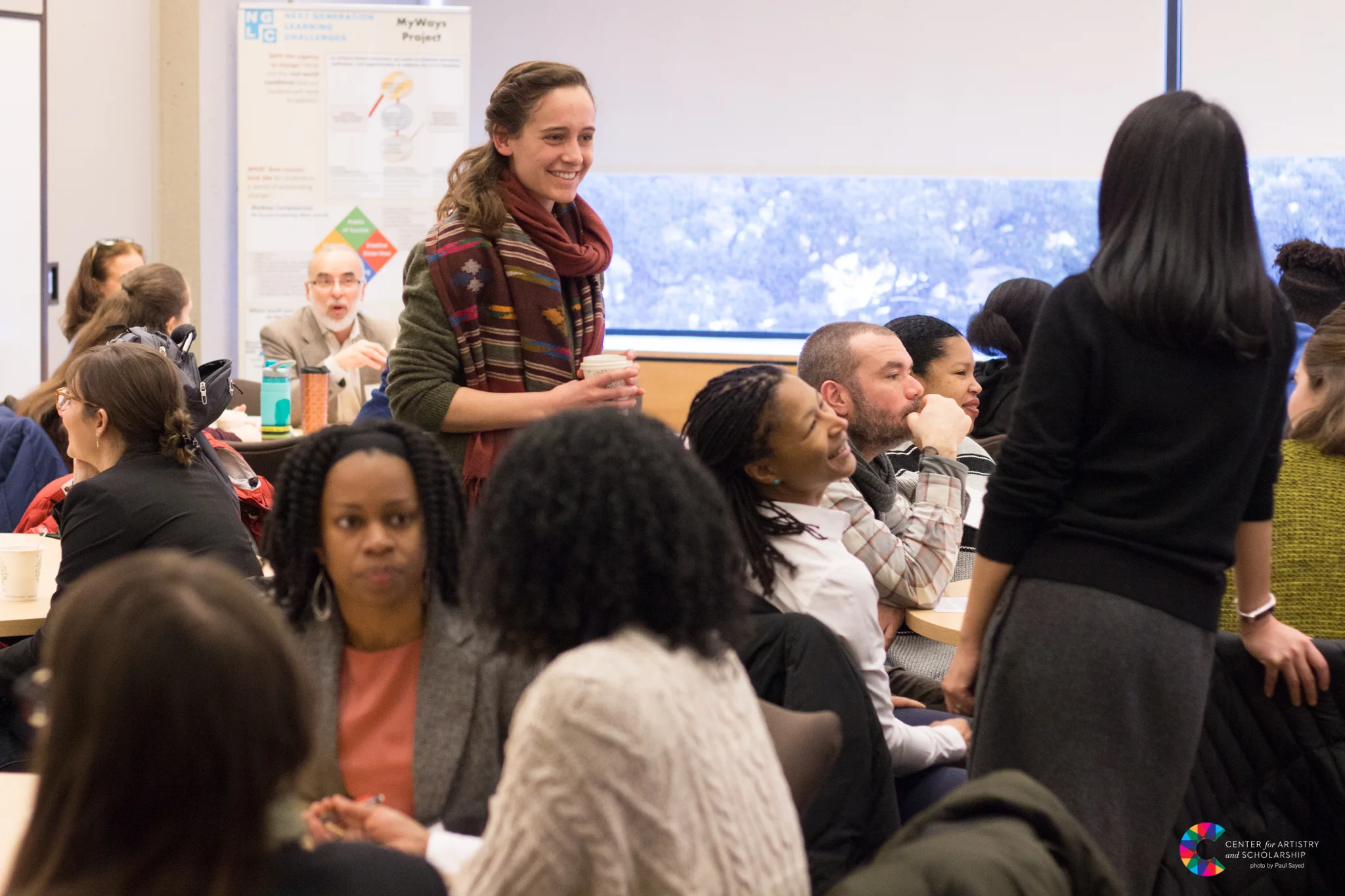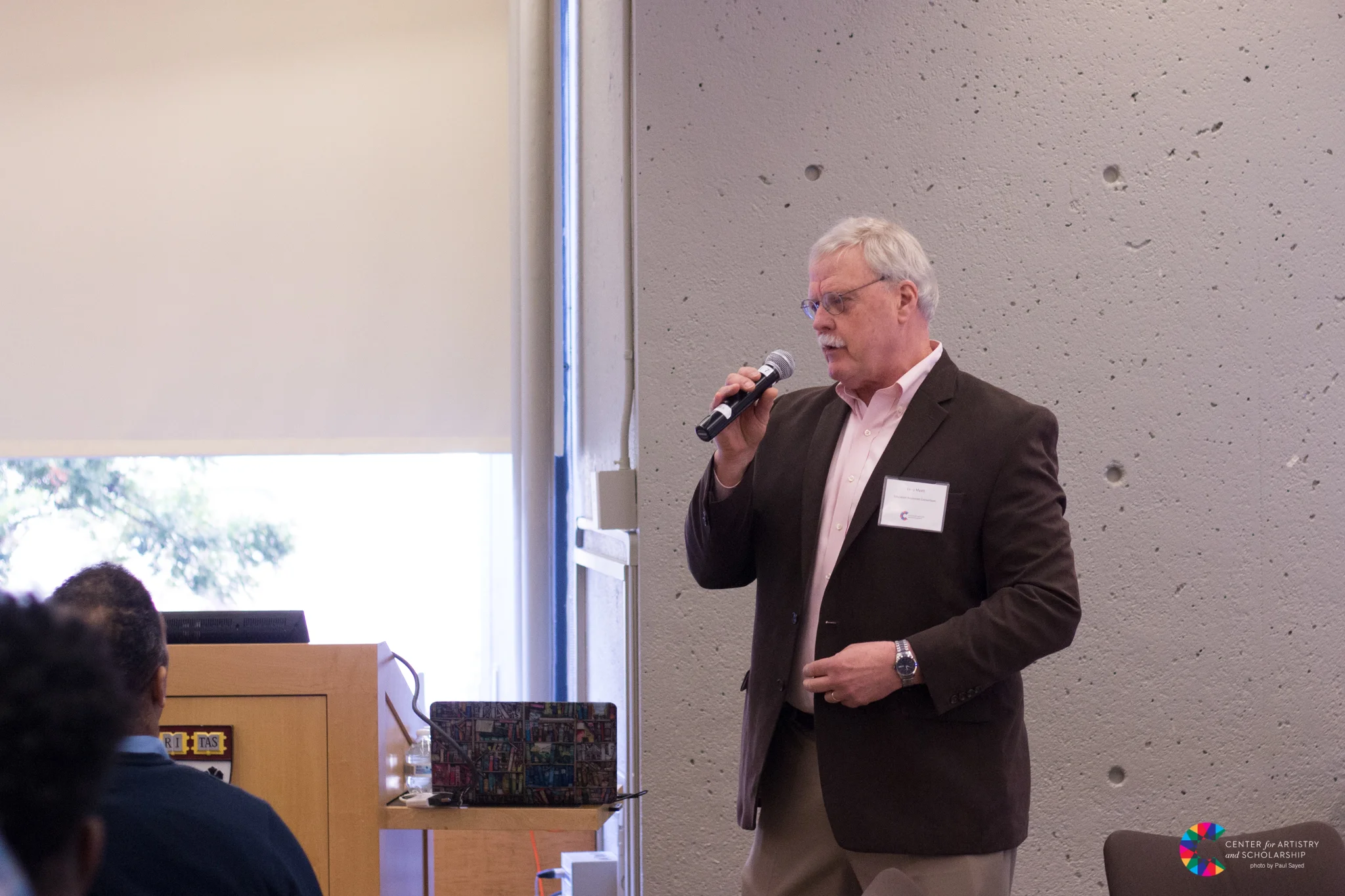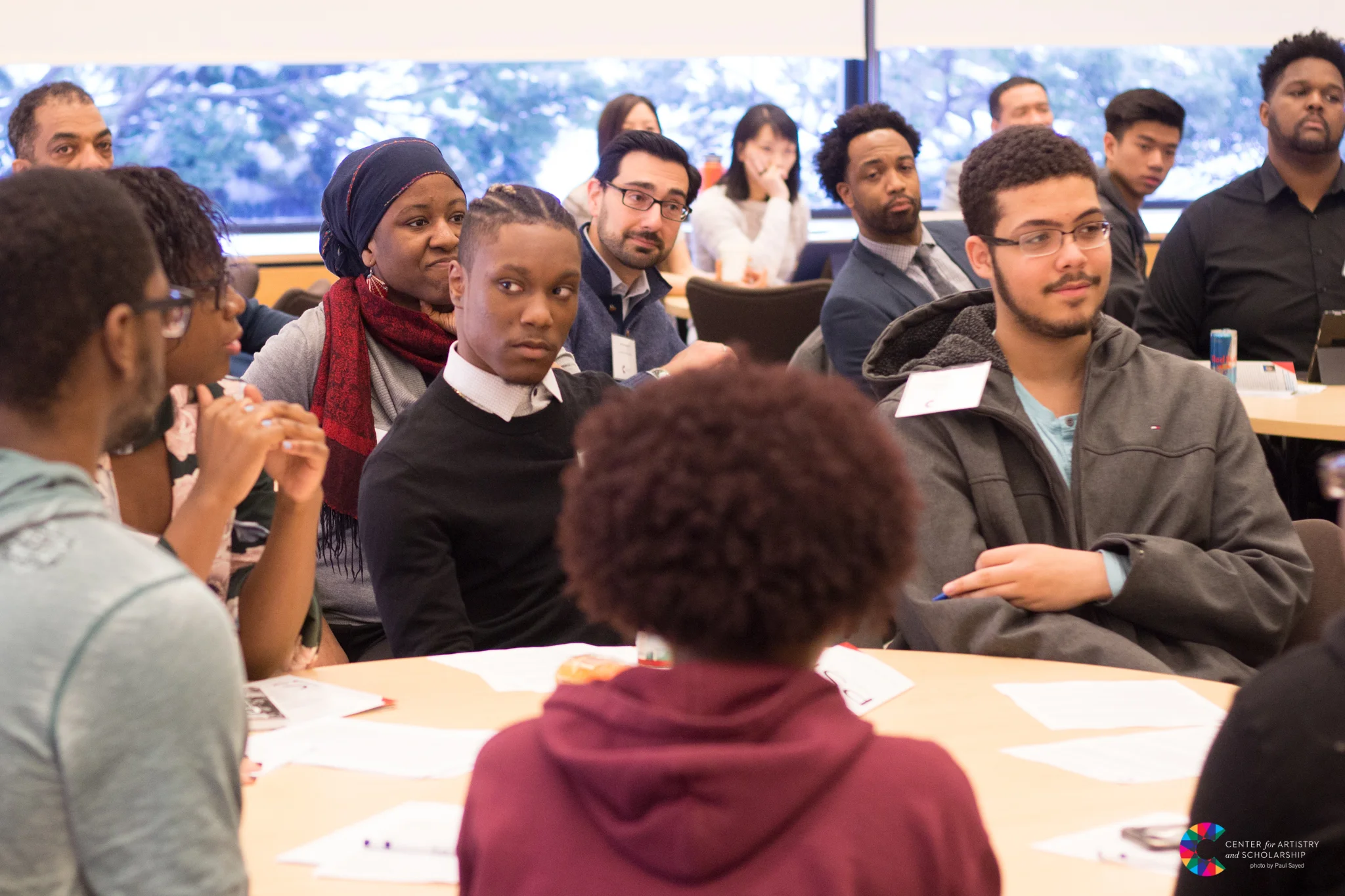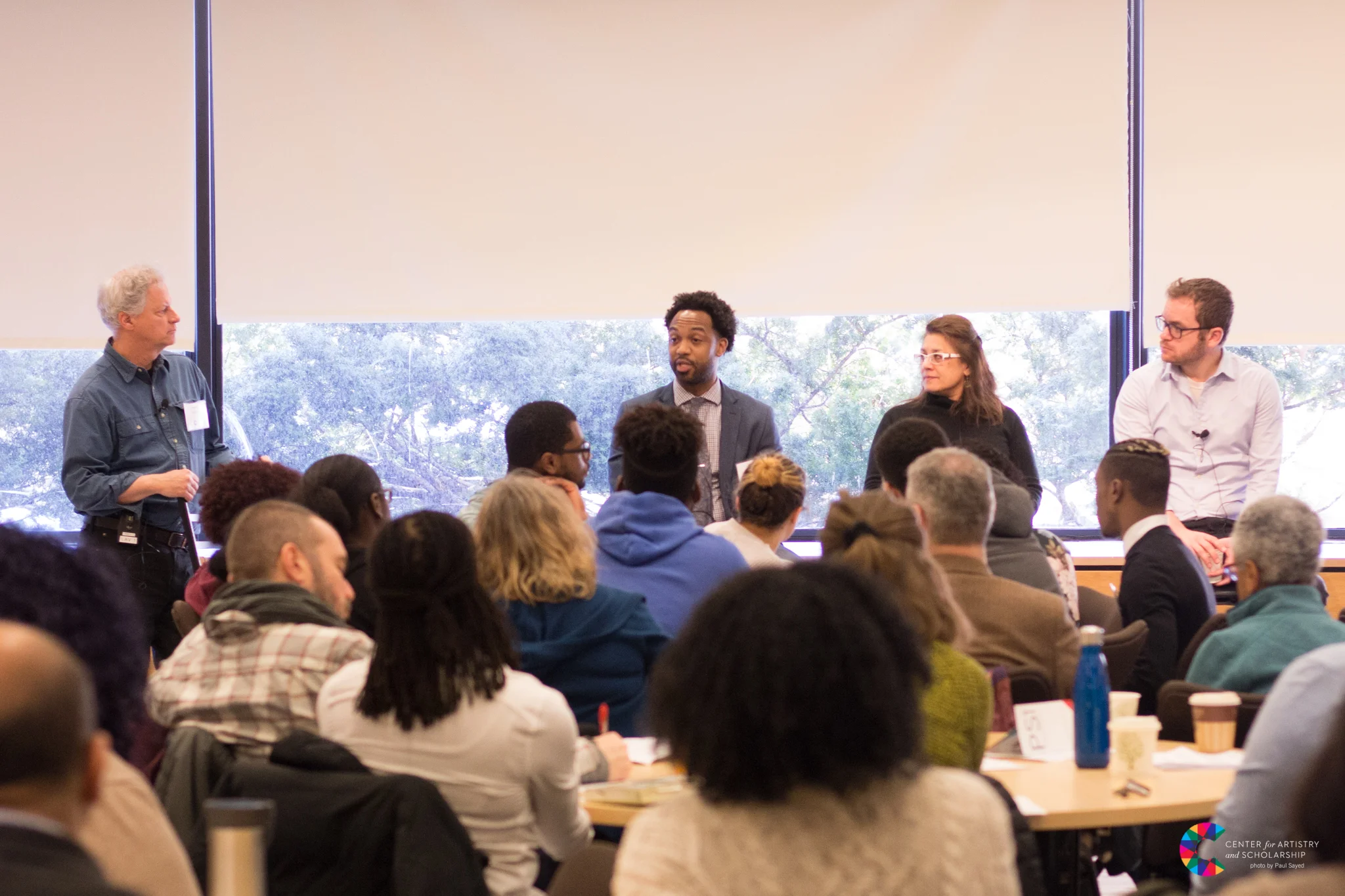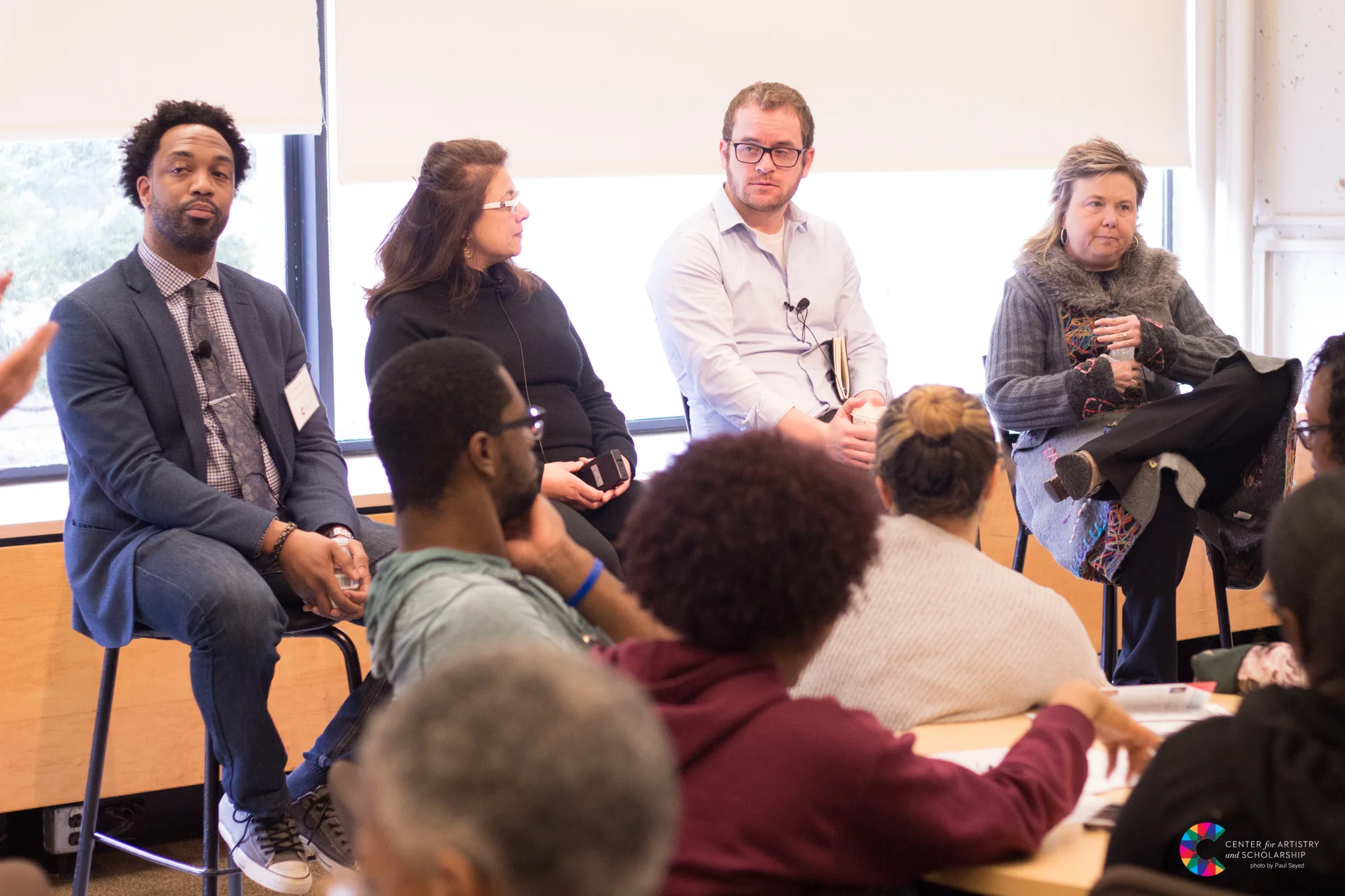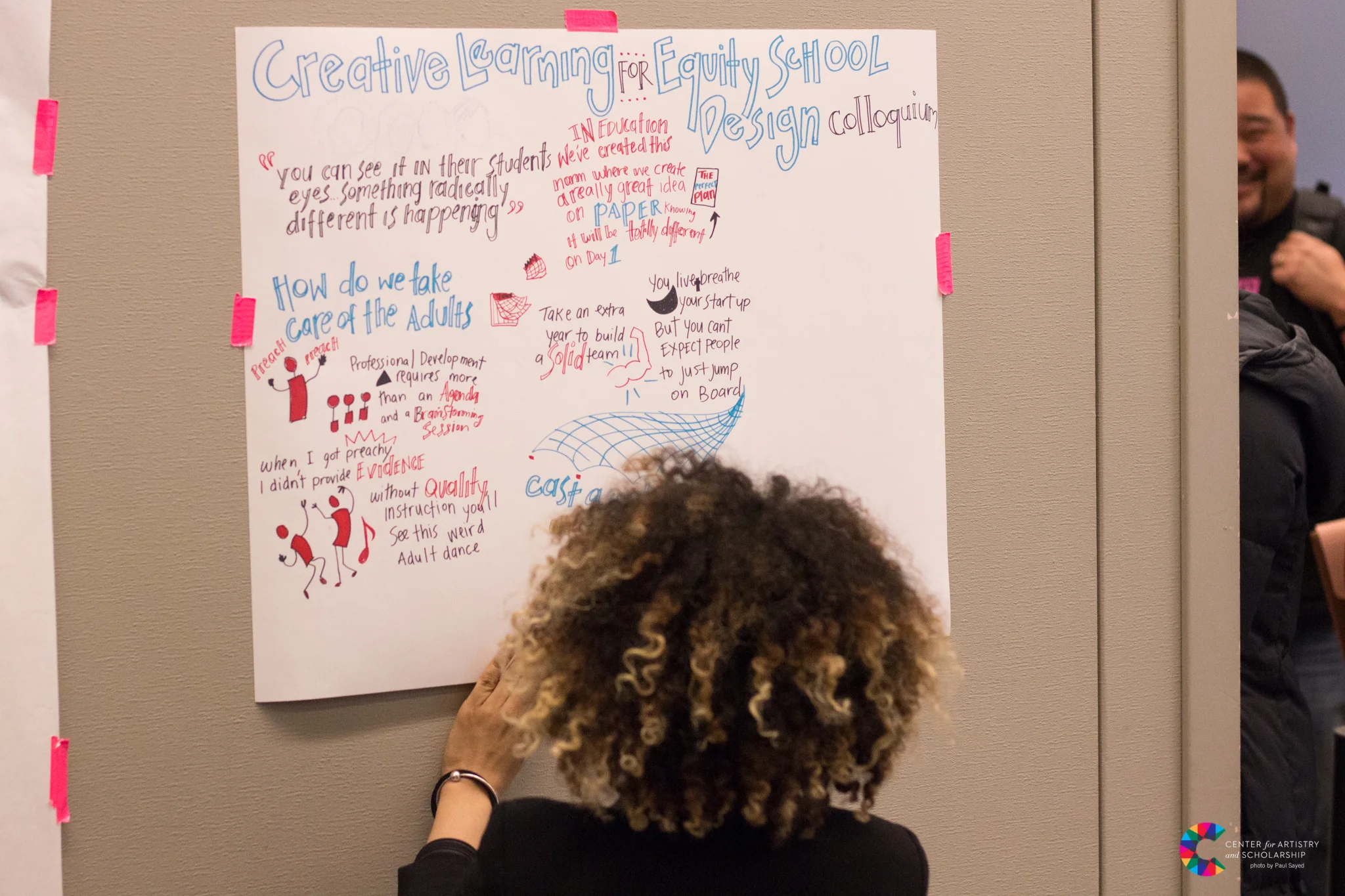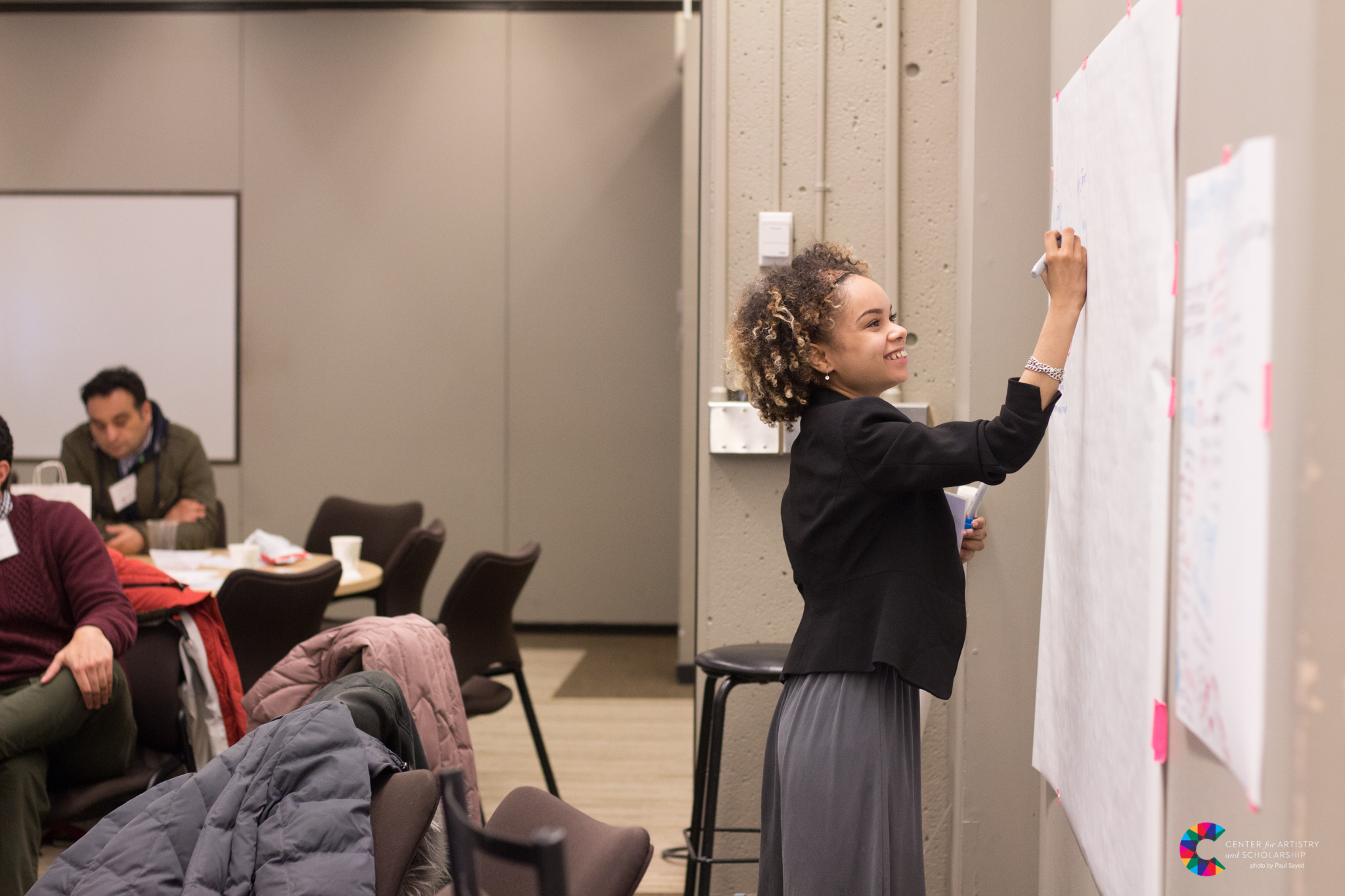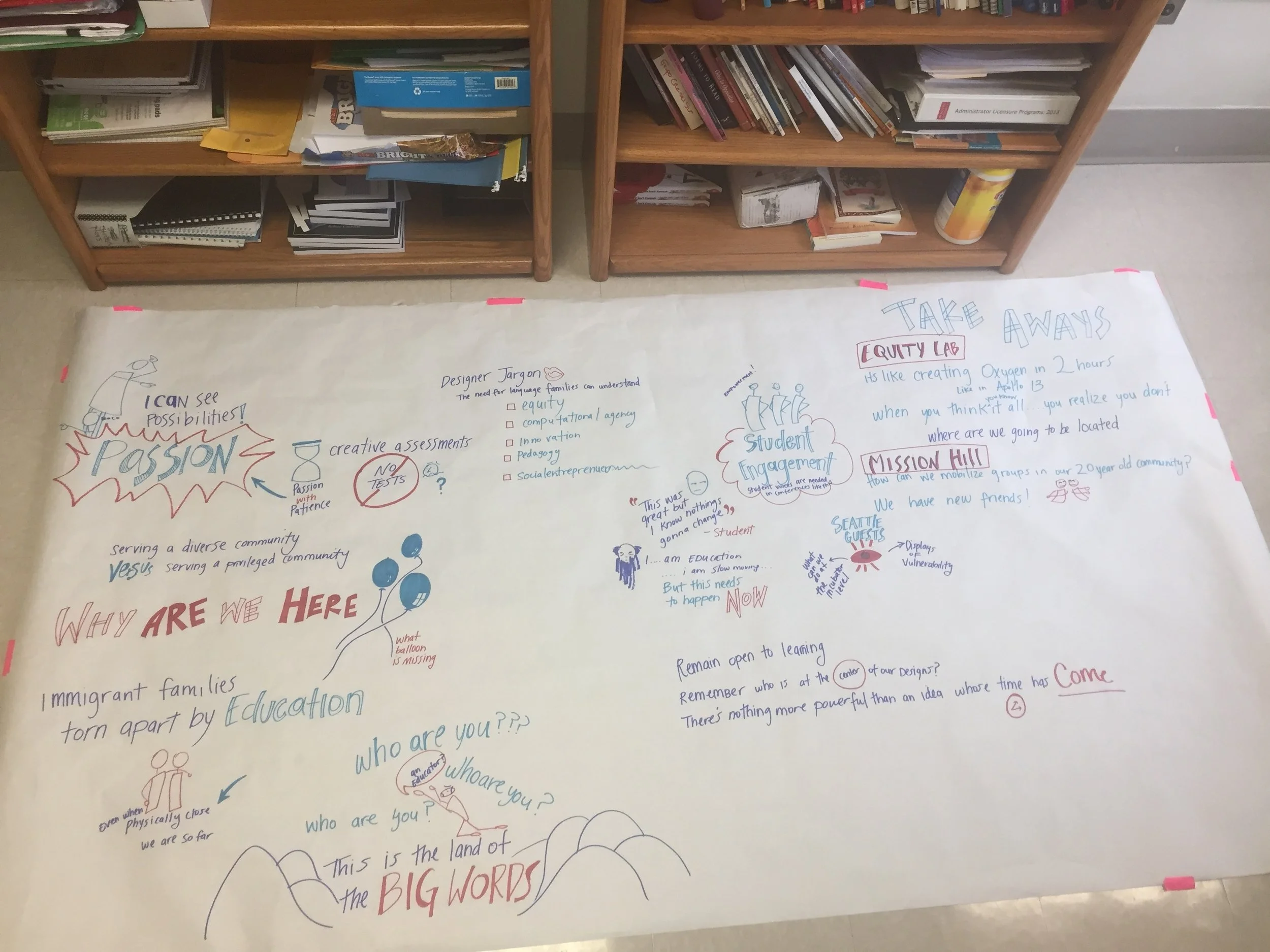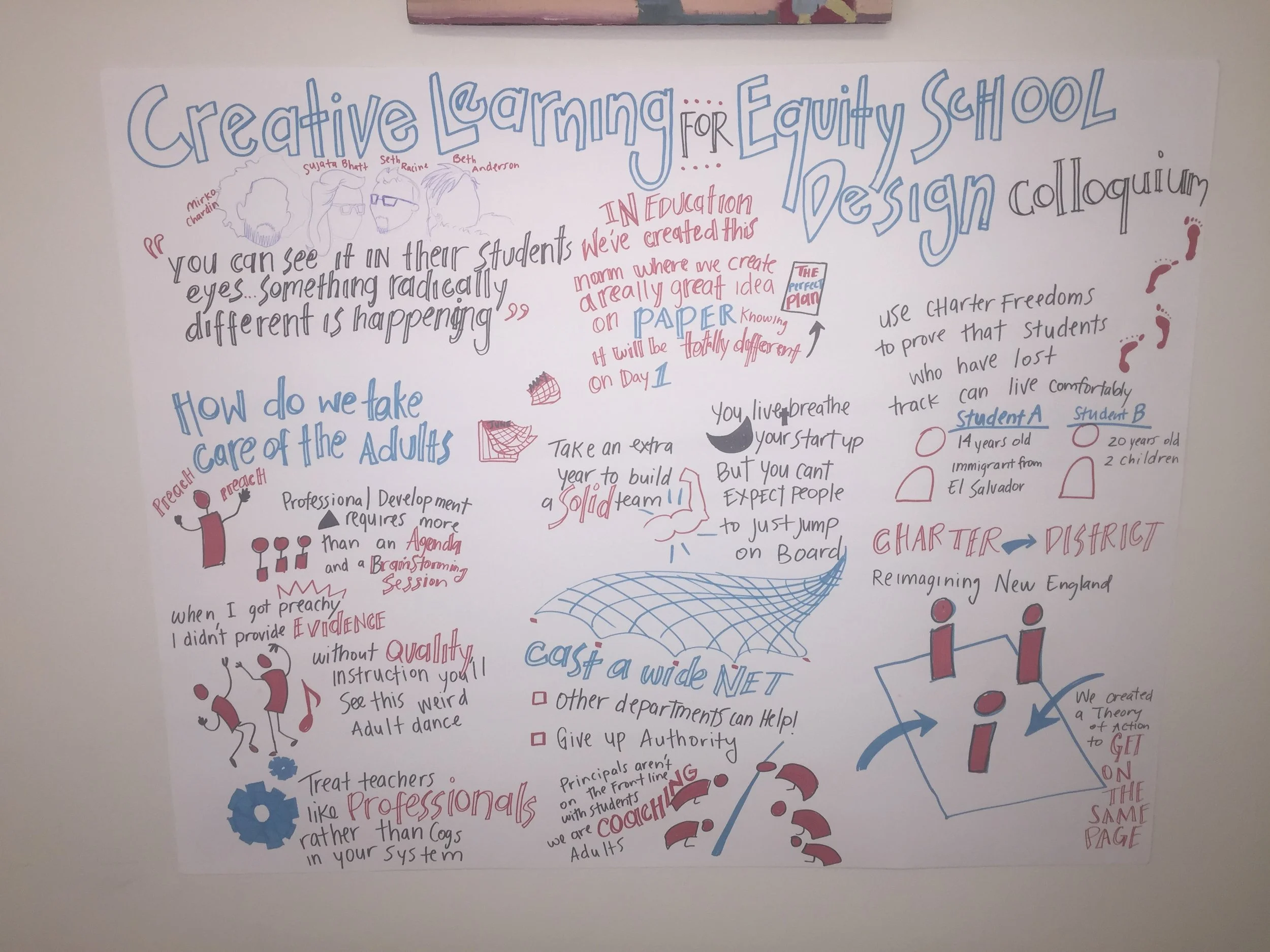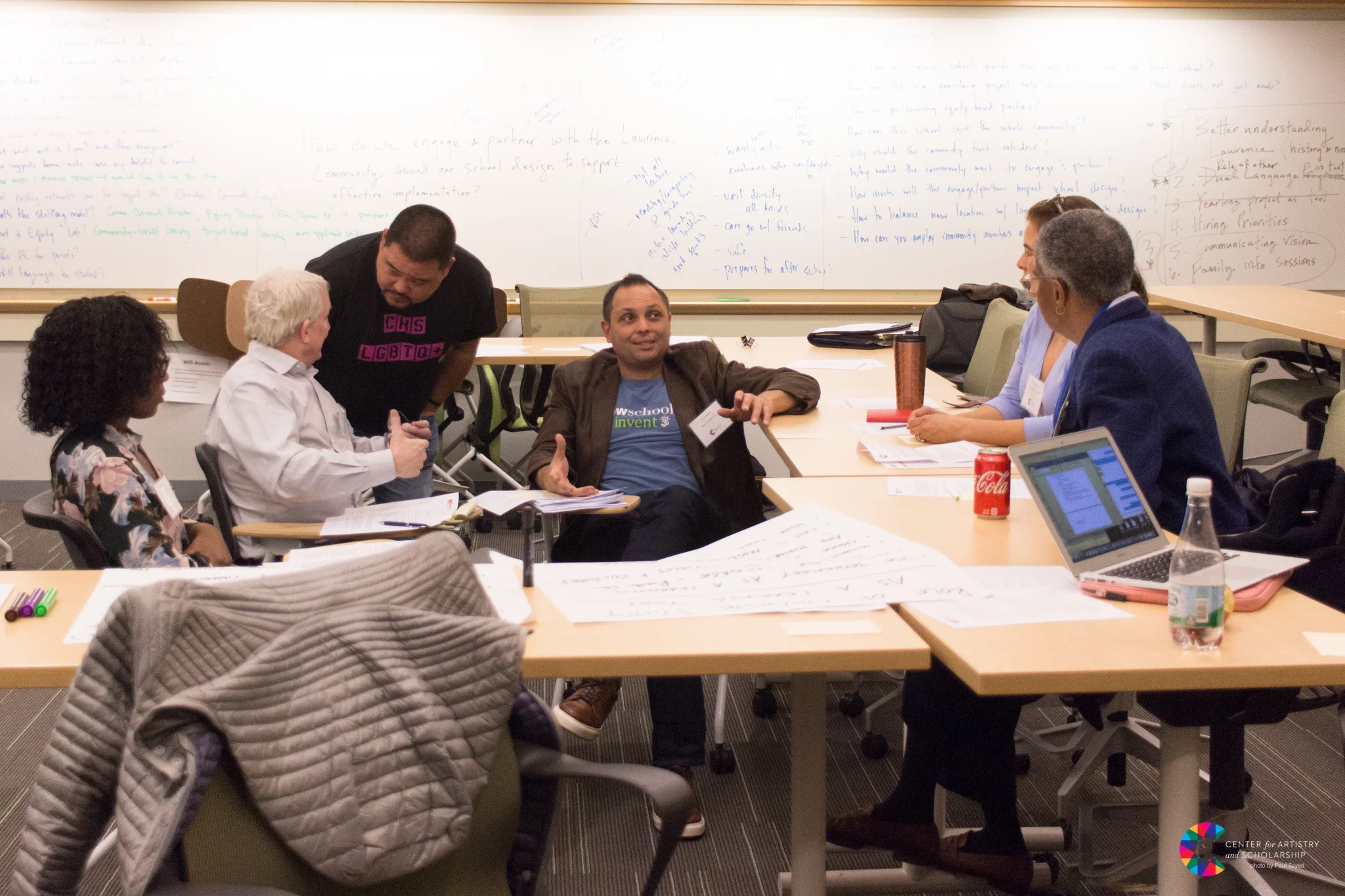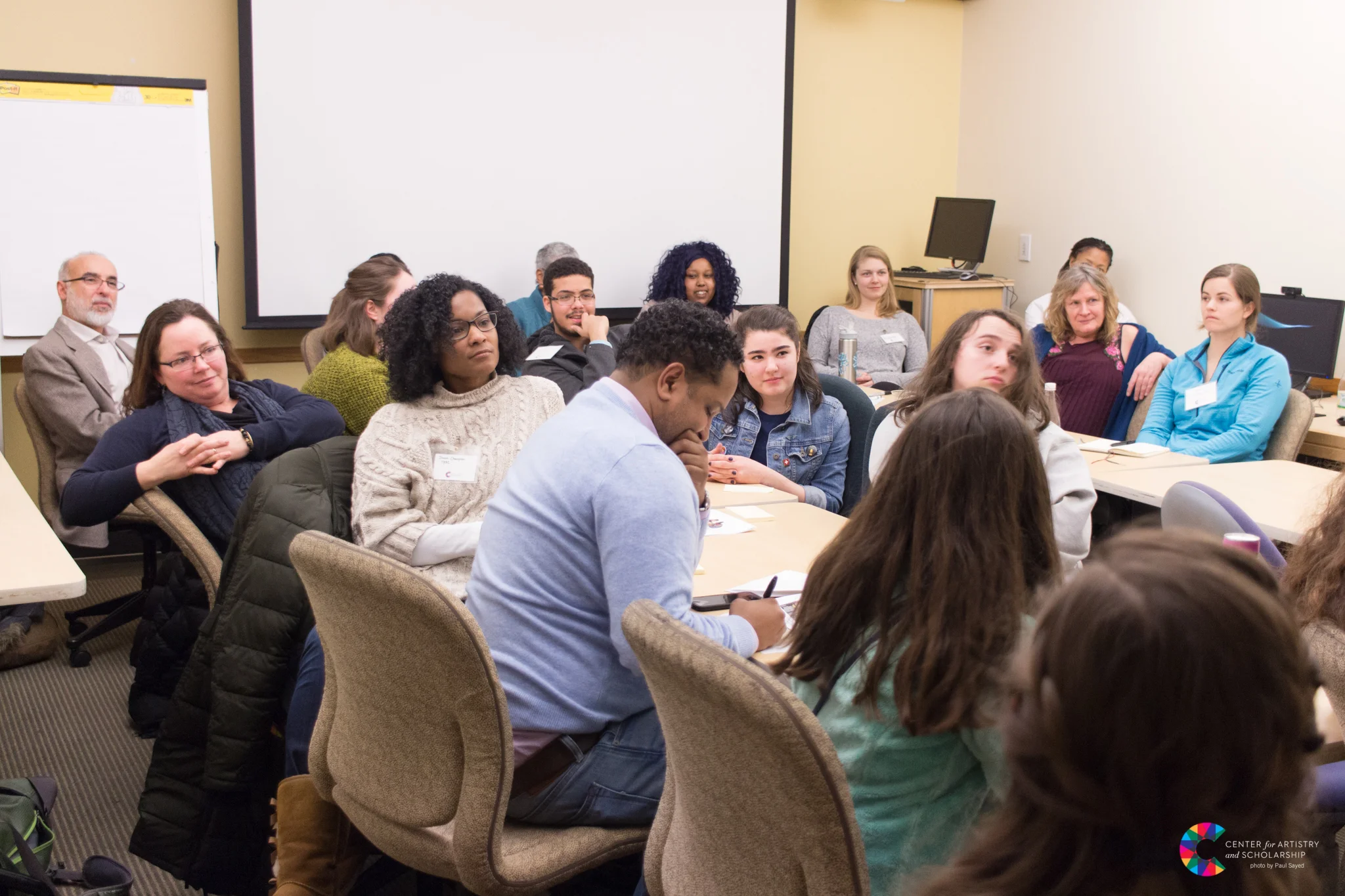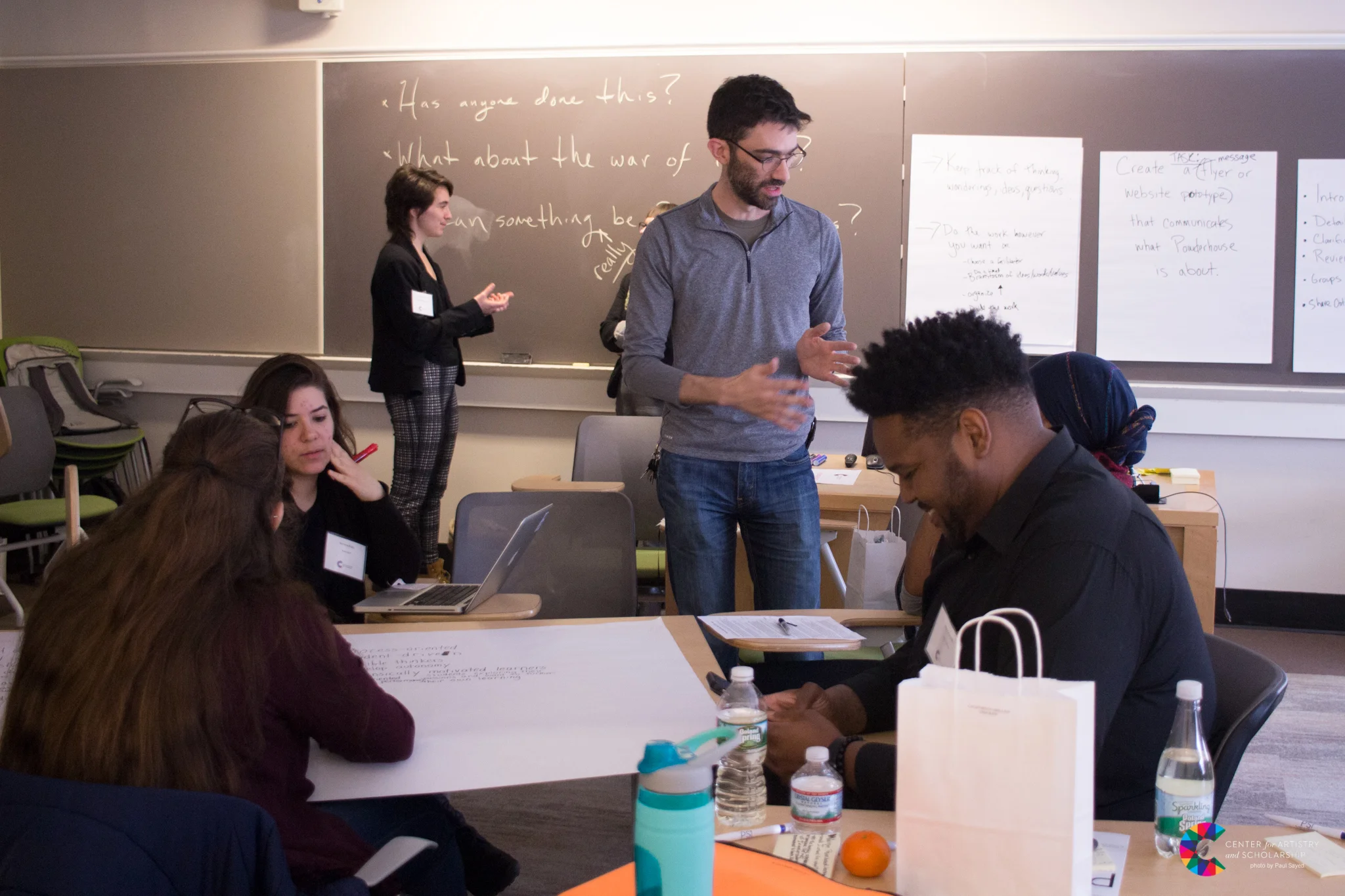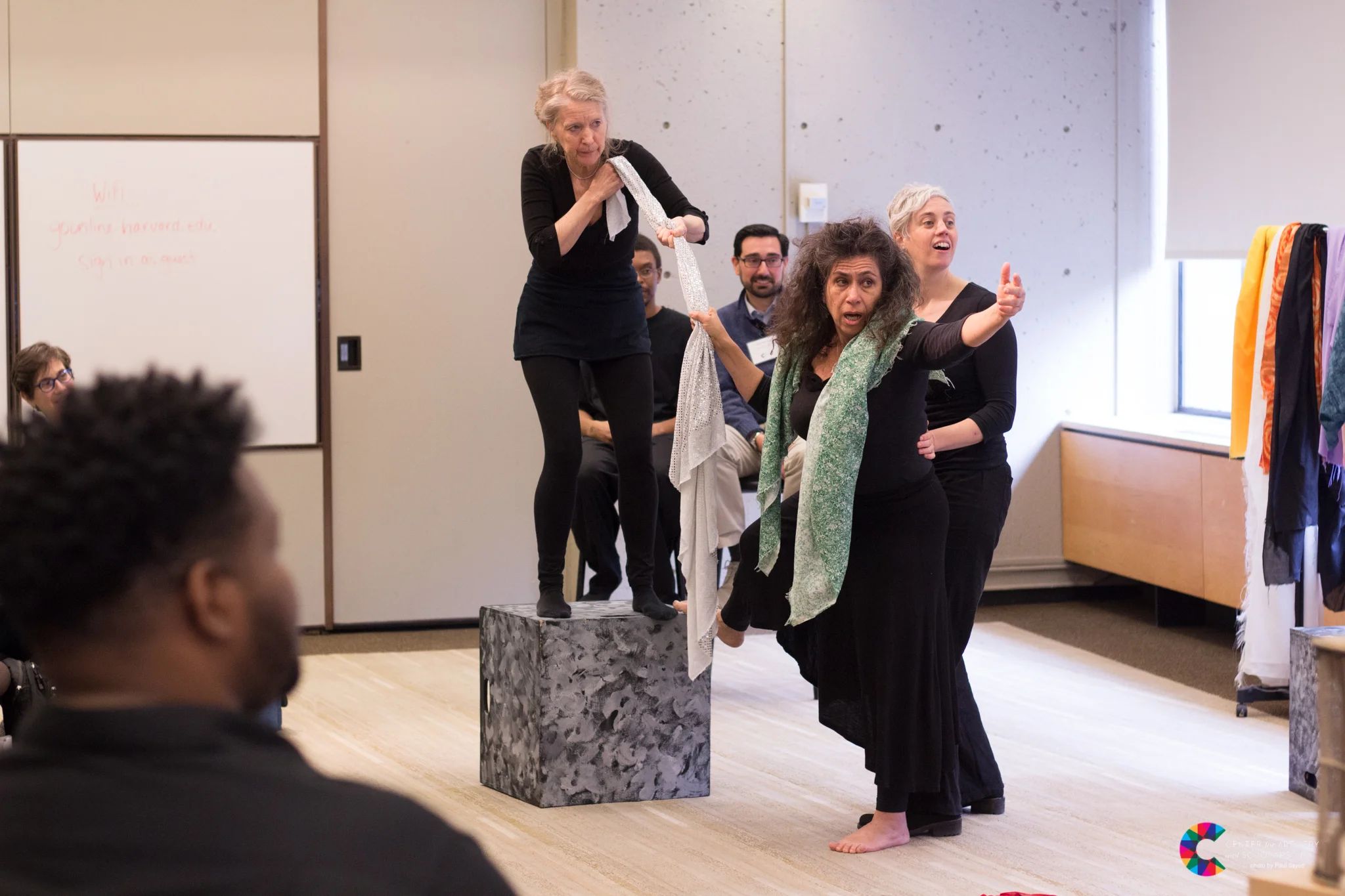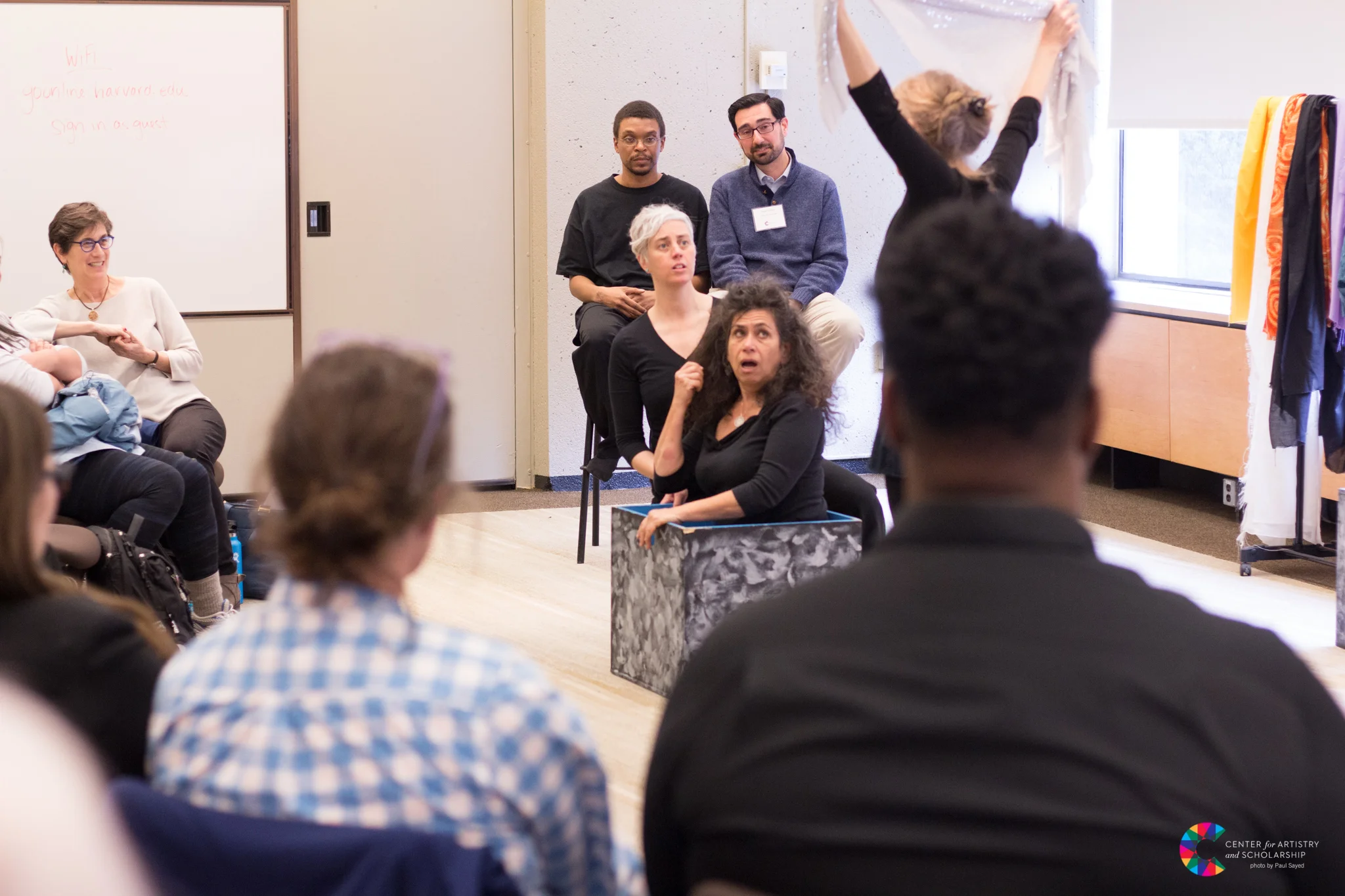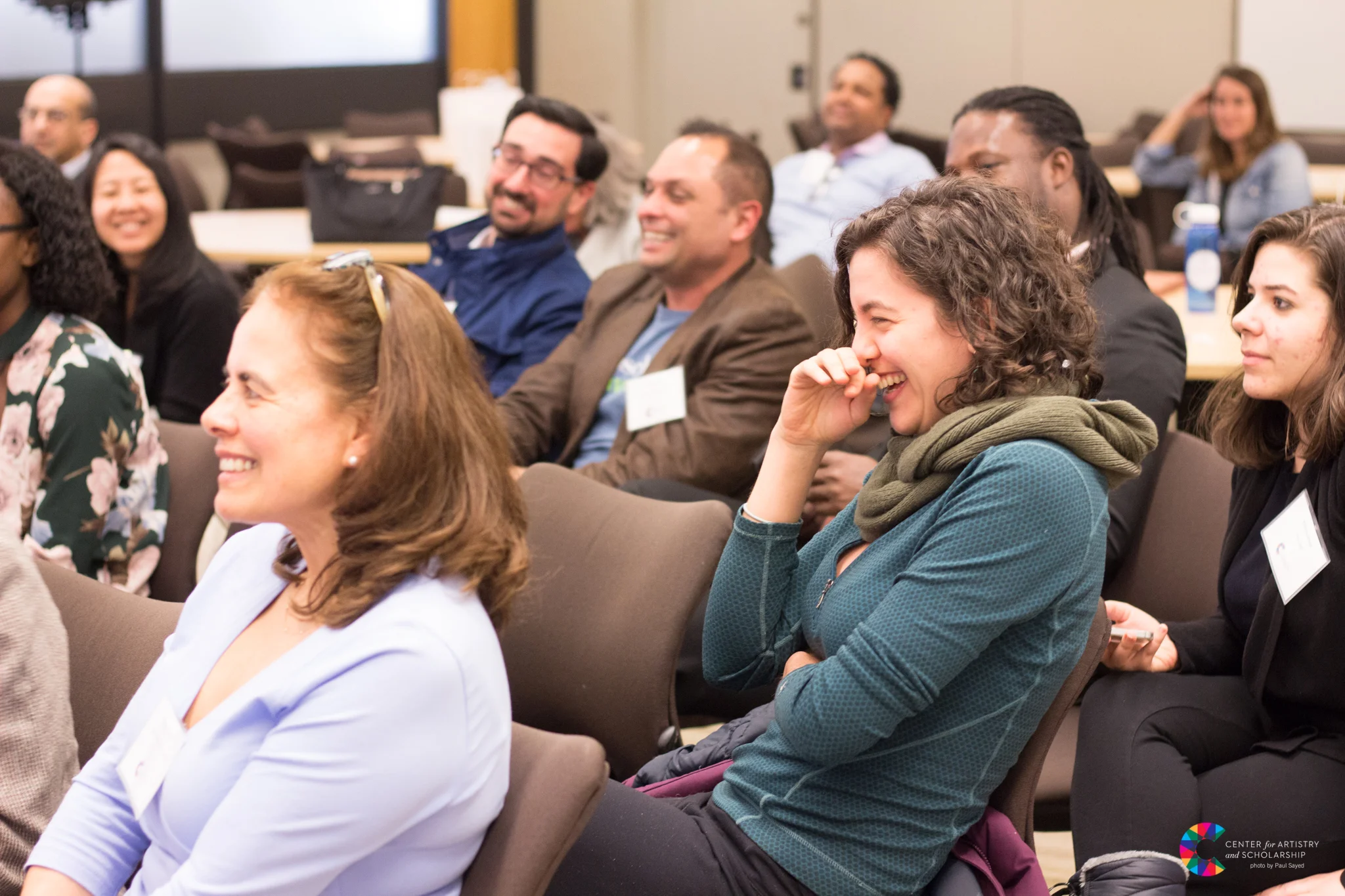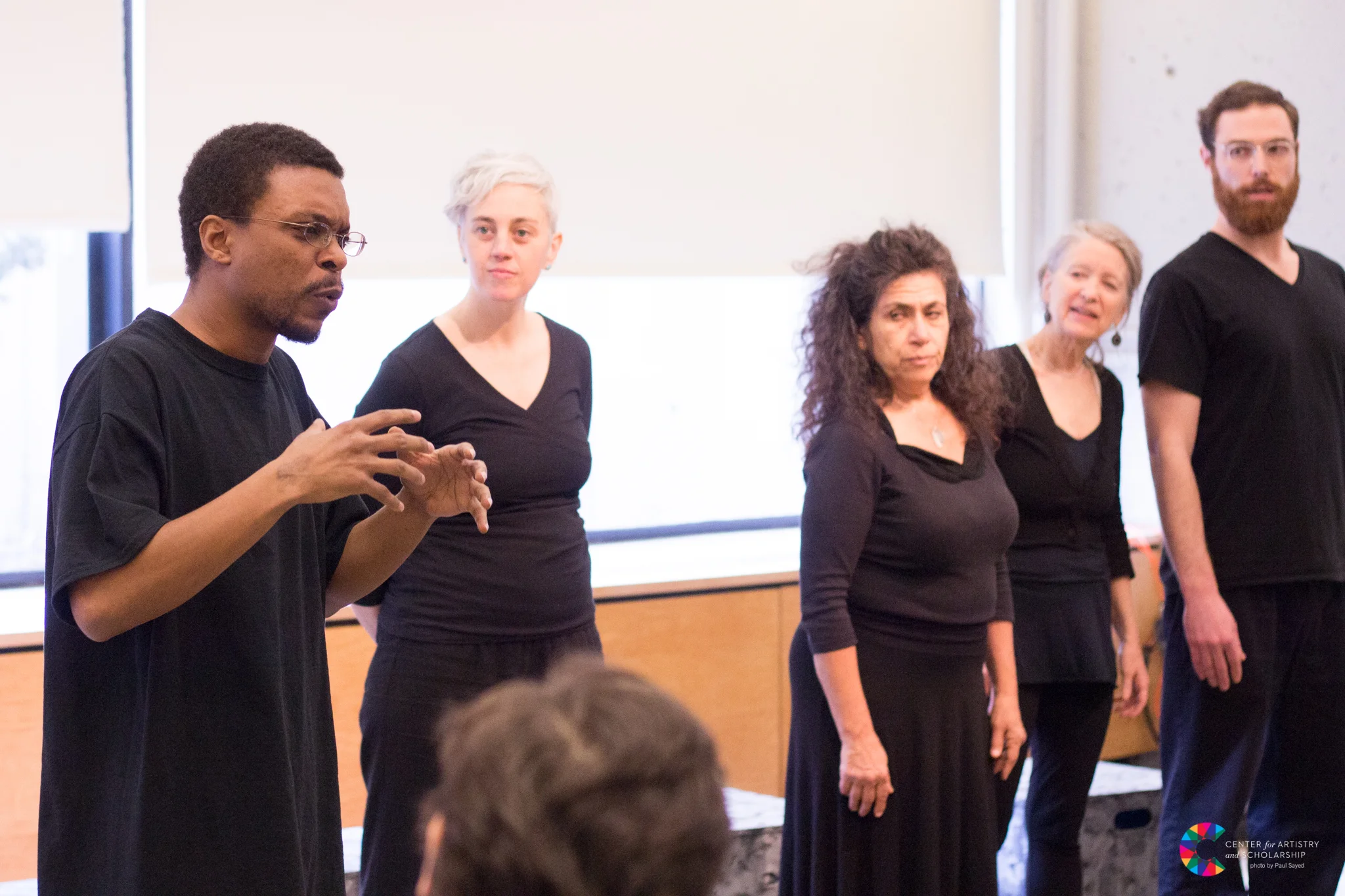Creative Learning for Equity School Design Colloquium
On Saturday, March 10, 2018, the Center for Artistry and Scholarship (CAS) hosted the Creative Learning for Equity School Design Colloquium, a day-long inquiry into school design using the arts, storytelling, and design thinking as ways of learning, collaborating, and addressing challenges among educators committed to creating equitable and innovative schools.
Supported by The Boston Foundation and EDUCAUSE/Next Generation Learning Challenges, the Colloquium is part of CAS’s commitment to support the schools that are part of our Innovative School Design Incubator, which aims to identify innovative, arts-infused school designs and assist them to launch these schools to serve students in the greater Boston region. The Incubator’s school design teams are:
- Boston Collaboratory School (BoCoLab), in the planning stages as a Boston Public School
- Equity Lab Charter School, in the planning stages as a charter school in Lawrence, MA
- Mission Hill High School, in the planning stages as a Boston Public School
- Powderhouse Studios, in the planning stages as a Somerville Public School
Our Priorities and Organizing Ideas
A recap of the day’s events and learning follows. First, here are our principles about the best ways to bring people together to leverage the power of collective thinking to create and sustain great schools.
Always include and prioritize student voices. Eight young people from the Boston Student Advisory Council and several other current high school students spent the day sharing their experience and advice with the school designers. We’re grateful to all of them, and to Youth on Board for facilitating student participation.
Value experience by learning from those who have already walked the road. Larry Myatt of Education Resources Consortium and CAS’s Executive Director Linda Nathan co-facilitated the Colloquium. Informed by their long and eventful shared history as school designers and leaders both at Fenway High School and within pilot/autonomous school efforts in Boston and beyond, Linda and Larry led the conversation with equal parts urgency and levity.
Always seek to expand expertise and range of perspectives. We invited experienced school designers connected to the CAS network to work with the school teams as coaches and facilitators. These coaches were:
- Angie UyHam, district design and innovation coach in the Cambridge Public Schools and Founder and Director of the Cambridge Educators Design Lab
- Hannah Kehn, Founder of New Visions Charter High School for the Humanities IV in New York City
- Hannah Williams, school designer and coach working with School Foundry in the Seattle, WA region
- Josue Gonzalez, Director of El Sistema at Conservatory Lab Charter School and graduate of CAS’s Perrone-Sizer Institute for Creative Leadership (PSi)
- Ramiro Gonzalez, who moved from being a longtime staff member at Boston Arts Academy to become the founding STEM teacher at 360 High School in Providence, RI
- Sung Joon (Sunny) Pai, creative education leader and school founder in Boston who is currently the Chief of Staff of Charlestown High School and Administrator-on-Assignment for the Boston Public Schools
We also invited several designers who work with Hannah Williams and Jeff Petty at School Foundry, a project of the Puget Sound Consortium for School Innovation. Bringing energy and ideas from another part of the country added real value to the conversation and helped designers from opposite coasts find common ground.
Document the process. We asked students from the Harvard Graduate School of Education, where we held the Colloquium, to document the team’s design challenges in notes and photographs. Additionally, Mahmoud Sayani, a school designer and writer, participated as an observer; at the conclusion of the Innovative School Incubator project, we will be publishing the Massachusetts School Design Playbook, which will include Mahmoud’s expertise and documentation of the design teams’ work. Paul Sayed from the CAS staff captured the day through the wonderful photos that we’re sharing here. Graphic artist Amber Torres joined us to capture images, phrases, and connections from the day through drawing and graphic notetaking. Amber’s depiction of the words and ideas of the Colloquium appear here as well.
Voices of Experience Panel
The Colloquium opened with a panel of experienced school designers who reflected on new school design challenges through the lens of their own experiences. Andy Calkins, Deputy Director of Next Generation Learning Challenges, moderated a riveting conversation amongst the panelists. Panel participants included:
- Beth Anderson, CEO and Founder, Phoenix Charter Academy Network in Chelsea, Lawrence, and Springfield
- Sujata Bhatt, Managing Partner, Innovation at the Boston Public Schools and the founder of the Incubator School, a Pilot School in the Los Angeles Unified School District
- Mirko Chardin, founding principal of the Putnam Avenue Upper School in Cambridge
- Seth Racine, head of Open Architects, formerly the Deputy Superintendent for the Lawrence Public Schools and Deputy Chief Financial Officer for the Boston Public Schools
In response to Andy’s questions, these school designers and founders reflected on their experiences as innovators. Andy started the conversation by asking, “What element of your work has been particularly challenging, and how have you addressed it?”
Cambridge school founder Mirko Chardin responded: “Most important is to understand what it means to be the caretaker of a community. How do you take care of the adults so they understand what they are expected to do to take care of the children? What does it mean to authentically teach and support them? It means thinking through how to structure meetings. You have to plan the “assessments” for the adults that will help you know whether they understood. You have to enable adults to experience the learning you want the students to experience. As school leaders, you are creating structures and supporting adults, and you always have to be mindful of this.”
Sujata Bhatt, reflecting on her school design work in Los Angeles and innovation leadership in Boston, offered: “As a school founder, I was thinking about the vision for [the] school, but I wasn’t always thinking about the adults. Everything needs to be co-constructed. Take an extra year and work on the systems. Where and when humans interact with each other is what matters. It’s important to remember that you may be driven as a founder, but you cannot ask others to make the same sacrifice. Everything was a design challenge: classroom norms, professional development, etc. Everything became about walking the walk. Some teachers would buy into the theory but not in practice. Your hiring pathway has to reflect your vision, and that’s why we brought students into the hiring process. To prevent teachers’ loss of agency, we relied on co-constructing our work. For example, we planned staff meetings with an open process. We had a whiteboard in the staff room where teachers could write down issues to be addressed. You have to treat teachers as professionals and be willing to give up control.”
Seth Racine drew on his experiences in Lawrence and Springfield as a supporter and agent of innovation. Wearing the “systems guy” hat, he noted: “It’s important to develop relationships with [the] central office and other people supporting you. Schools don’t exist as autonomous islands, but are part of ecosystems. Because people at the top turn over, build relationships with clerical staff who really do the work. It never hurts to cast a wide net. You have to know as much as possible about central office politics.”
Beth Anderson offered her experience as the founder of a network of charter schools, noting: “Our greatest challenge has been getting on [the] same page about what we’re supposed to do. It took us a year to write our theory of action. We had to summon up our organizational courage to face up to reality collectively. When we did, we realized the primacy of values in shaping the work.”
Following questions and answers with the audience, Andy asked the panelists to offer high-altitude advice:
- Mirko Chardin: Know your story; own your story; your story is your power.
- Sujata Bhatt: Build a broad and deep stakeholder base.
- Seth Racine: Prioritize fires when your house is burning.
- Beth Anderson: Make sure you have the right people at the table.
Design Challenge Deep Dives
BoCoLab: How might we build educators' capacity to support Boston Public School students in the pursuit of new and innovative pathways (design, advanced manufacturing, cybersecurity, etc...), so that “an innovator mindset” becomes the norm across the district?
Equity Lab Charter School: How do we engage and partner with the Lawrence community around our school design to support effective implementation?
Mission Hill High School: What are high leverage partnerships and actions for developing our high school as we envision a truly innovative and inclusive high school that will support the needs and amplify the diverse strengths of all students, especially those who have been systematically under-served?
Powderhouse Studios: When a school doesn't have subjects or class periods or summer vacations, it can be hard to talk about with youth and families who have come to expect all these things from school. This problem gets harder when we consider that families bring all different backgrounds, experiences, and resources to bear on their expectations of school. Powderhouse Studios would like your help communicating (without buzzwords or jargon) the rigor and value of a fully project-based model to all these families.
The school teams and their coaches met with a diverse group: Boston Student Advisory Council members, stakeholders whom they had invited, and others interested in school design who chose to invest in the work by spending the day with us. Along with background, observations, and evidence, the teams shared their challenges in order to develop next steps toward solutions.
Playing Back and Moving On
At the end of the day, the design teams and design challenge deep dive participants reconvened to reflect on the day with Playback Theatre, an improvisational theatre experience in which actors invite audience members to share ideas and stories, and then immediately interpret and retell those stories in improvised scenes. Will Chalmus, an educator and Playback Theatre artist, gathered actors Myles Green, Annie Hoffman, Shoshana Narva, Melissa Nussbaum Freeman, and Ukumbwa Sauti to interpret the day’s experiences. All experienced educators themselves, the actors played back our stories from the day in ways that crystalized the meaning and potential power of the work.
As part of the experience, George Papayannis, founding principal of Equity Lab Charter School, engaged in an extended conversation with Playback Theatre’s Will Chalmus, sharing both the day’s experiences and more extended reflections on the path that brought him to and through his life as an educator, which the company played back in a deeply moving improvisation. “The Playback Theater group brought my thinking to life and amplified the emotions and the realizations developing within me,” George noted. “In short order, their interpretation helped me make sense of a new revelation. And as a bonus, the experience led to new conversations with audience members who shared a similar experience.”
Thank you!
We want to thank the many people and organizations that joined us to make this day possible! We thank our design teams for their extraordinary creativity, tenacity, flexibility, engagement, and vulnerability. Thanks to Andy Calkins for agile and thoughtful facilitation of the experienced educators’ panel, and the panelists for their honesty and clarity. The team coaches and facilitators are amazing allies in this work -- quick on their feet and open to new approaches. We’re grateful for Youth on Board, the Cambridge Educators Design Lab, Education Resources Consortium, graphic artist Amber Torres, Playback Theatre, and the Harvard Graduate School of Education students. We are also thankful to the staff at the Gutman Library for their dedicated support both during and prior to the event. CAS Community Liaison Rachel Sacks provided accomplished organizational support, and Lisa Sankowski, PSi program manager, provided invaluable on-the-spot assistance.
